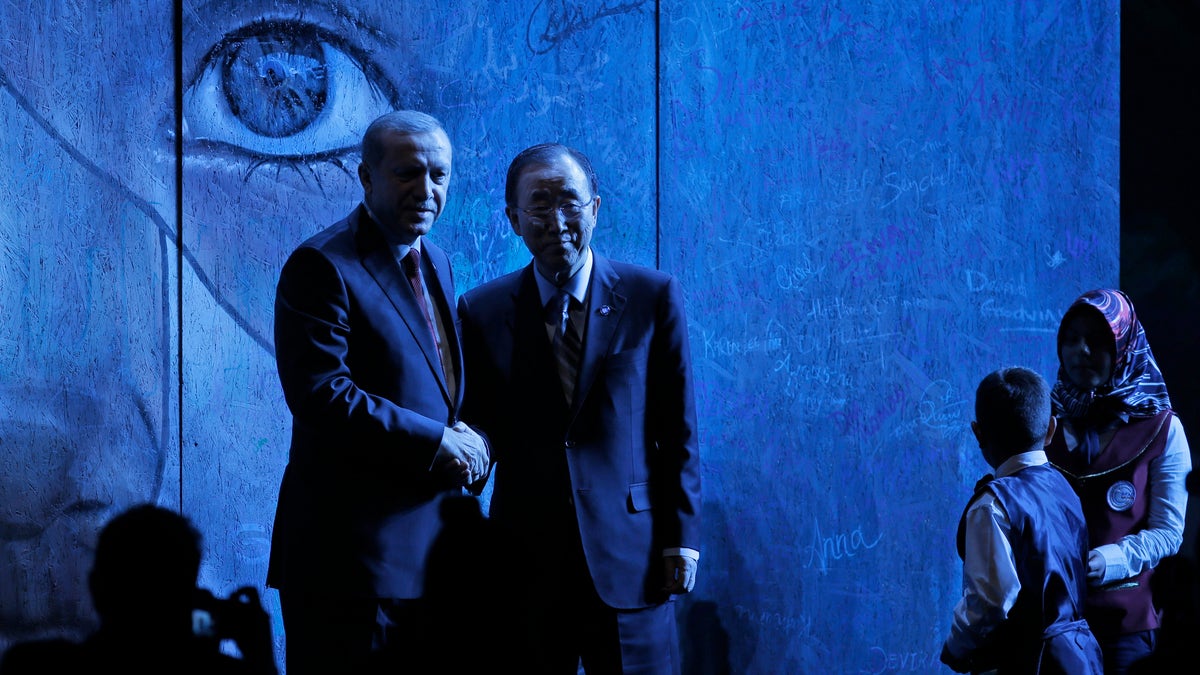
United Nations Secretary General Ban Ki-moon, centre and Turkish President Recep Tayyip Erdogan, pose in front of a graffiti at the closing ceremony of the World Humanitarian Summit in Istanbul, Tuesday, May 24, 2016. World leaders and representatives of humanitarian organisations from across the globe gathered in Istanbul on May 23-24, 2016 for the first World Humanitarian Summit, focused on how to reform a system many judge broken. (AP Photo/Lefteris Pitarakis)
It was the most important global gathering you’ve never heard of: the first World Humanitarian Summit concluded last week in Istanbul. Thousands of bigwigs from the U.N., governments, businesses and nonprofits. Hundreds of meetings. An unimaginable quantity of hot air.
You could ask: was it worth it? Should I care?
You should care because there are two worlds. One is a world of optimism and progress: there’s still pain and poverty but, in the big picture, people get healthier and live longer, more productive lives. The other is a world on fire: 1.5 billion people trapped in endless cycles of conflict and instability.
The thing is, what happens in the world on fire burns through to that other world and what it must contend with: over 60 million refugees; chronic economic fragility; terrorism.
It’s not enough to make sure people in crisis get food, find shelter, drink clean water and receive medical attention. We need to address the tough stuff like communal distrust and hatred, poor government and how big decisions that affect people’s lives are made accountable.
Global humanitarian action – the world’s firefighter – matters. Not only because saving lives is the right thing to do; it matters because a better world for people in crisis means a better world for all.
In the spirit of full disclosure, you should know that my organization, Mercy Corps, receives funding from the United Nations. You should also know we went to Istanbul with a clear head and open eyes, and one big demand: Let’s get real about how we, as humanitarians, face down conflict.
This demand is critical because conflict is now recognized not as one factor that drives humanitarian crisis, but as the factor.
Almost all humanitarian aid, amounting to $23 billion dollars last year, goes to lifesaving operations in brutal conflicts that have dragged on for years. That statistic alone tells us the system is broken: we’re repeating cycles of emergency response without ever getting to what’s causing the violence in the first place.
It’s not enough to make sure people in crisis get food, find shelter, drink clean water and receive medical attention. We need to address the tough stuff like communal distrust and hatred, poor government and how big decisions that affect people’s lives are made accountable.
Mercy Corps does this kind of work every day in places like Nigeria, where we are empowering those who fled the violence of Boko Haram to rebuild lost livelihoods. Or in the region surrounding Syria where we are bringing youth together, reducing tensions and offering an alternative to radical outlets. And in Iraq, where we are bringing girls who have been out of school back into the educational system, making brighter futures possible.
If we want to prevent crises from spiking again and again, we must better understand what really drives violence and conflict and invest in programs that help to stop it. For example, during the bloody civil war in the Central African Republic, our peacebuilding work transformed violent tensions between Christian and Muslim communities: more than 200 rival militiamen disarmed and joined community peace groups instead. The conflict continues, but we have shown ways to begin overcoming it.
Here’s where I see the Summit as having delivered: everyone involved, from the UN Secretary General on down, agreed that the prevention and termination of conflict is the number one humanitarian priority. The restatement of that priority is important. The world needs to focus harder on that goal.
The Summit also signed up to other important stuff. Major players like the World Bank and the United States made concrete pledges to break the bureaucratic stovepipes that currently channel aid money for either humanitarian or development goals, but not both at the same time. In today’s complicated world, that’s a false choice.
Here is what it didn’t do. Outside of an appearance by German Chancellor Angela Merkel and a few other heads of state, it did not deliver on political leadership. We knew it was never going to end the impunity that rogue regimes or violent extremists feel they possess for indiscriminate slaughter. That can only be solved by the U.N. Security Council rediscovering its political will and using the muscle of real statecraft.
But despite its shortcomings, the Summit fired a starting pistol for humanity’s greatest race: between a better world of shared progress and a divided world on fire. The agenda unleashed new forces of reform that will not rely just on the U.N. to bridge the gaps between us. Now we must get this right.








































